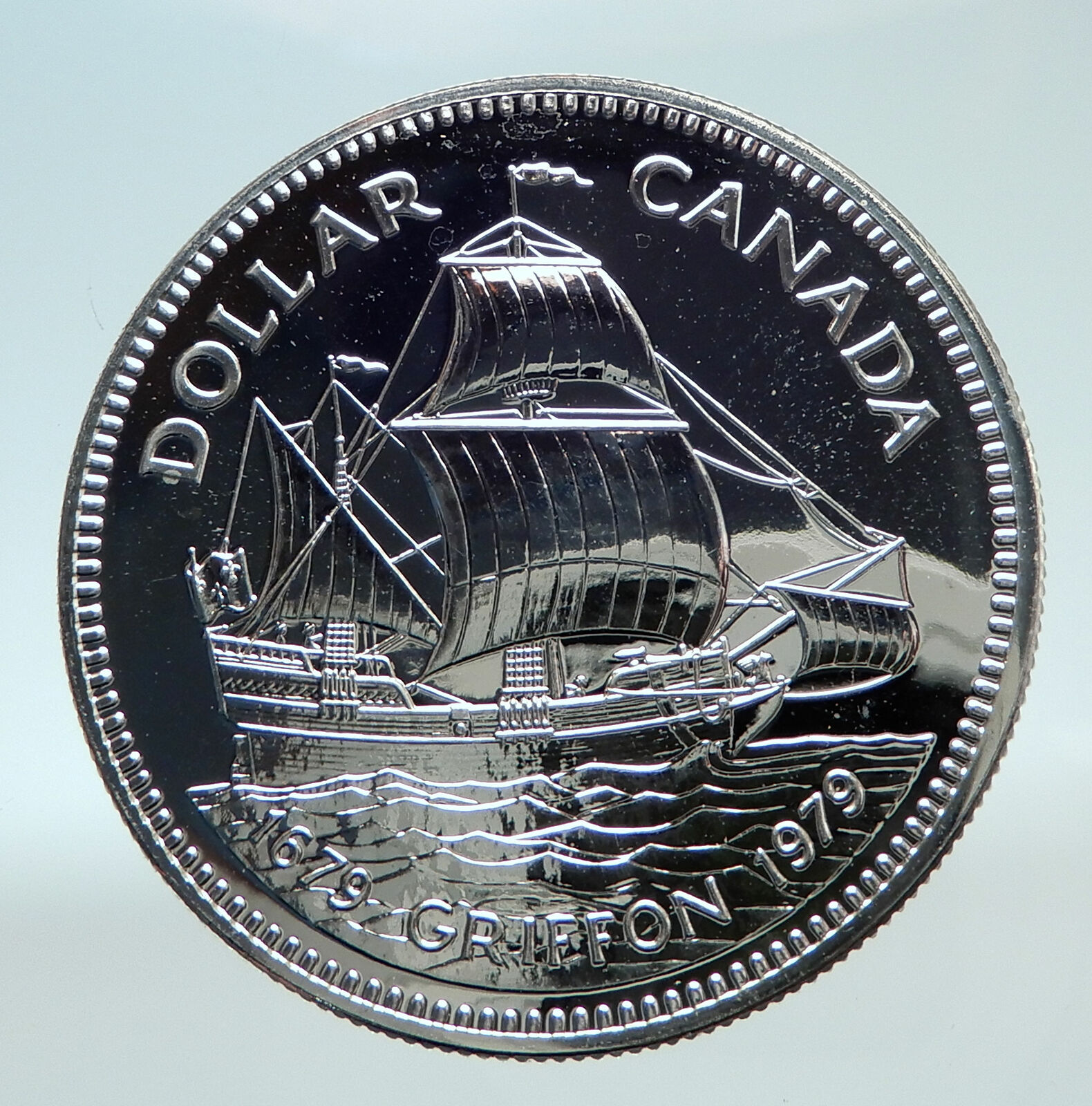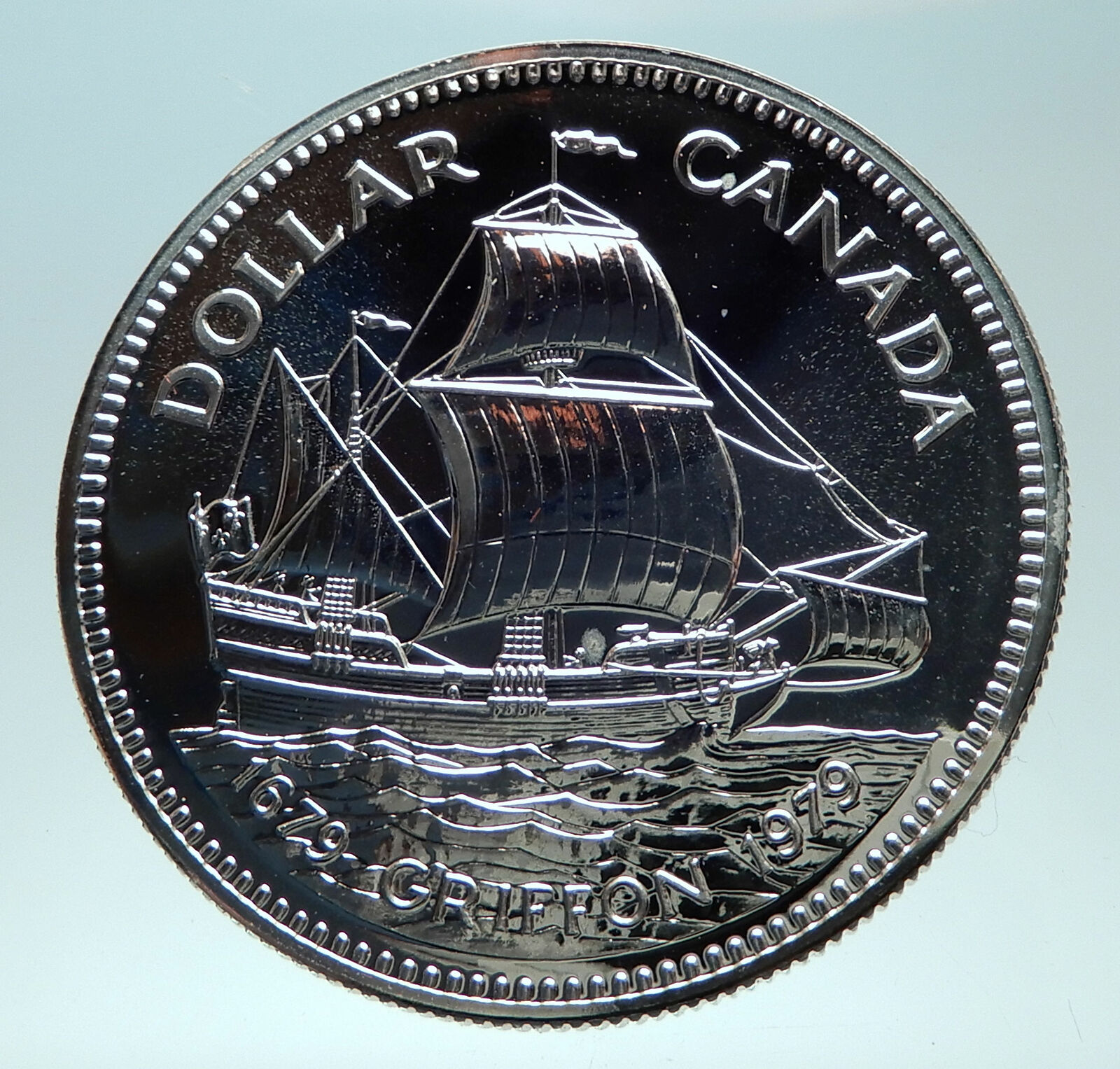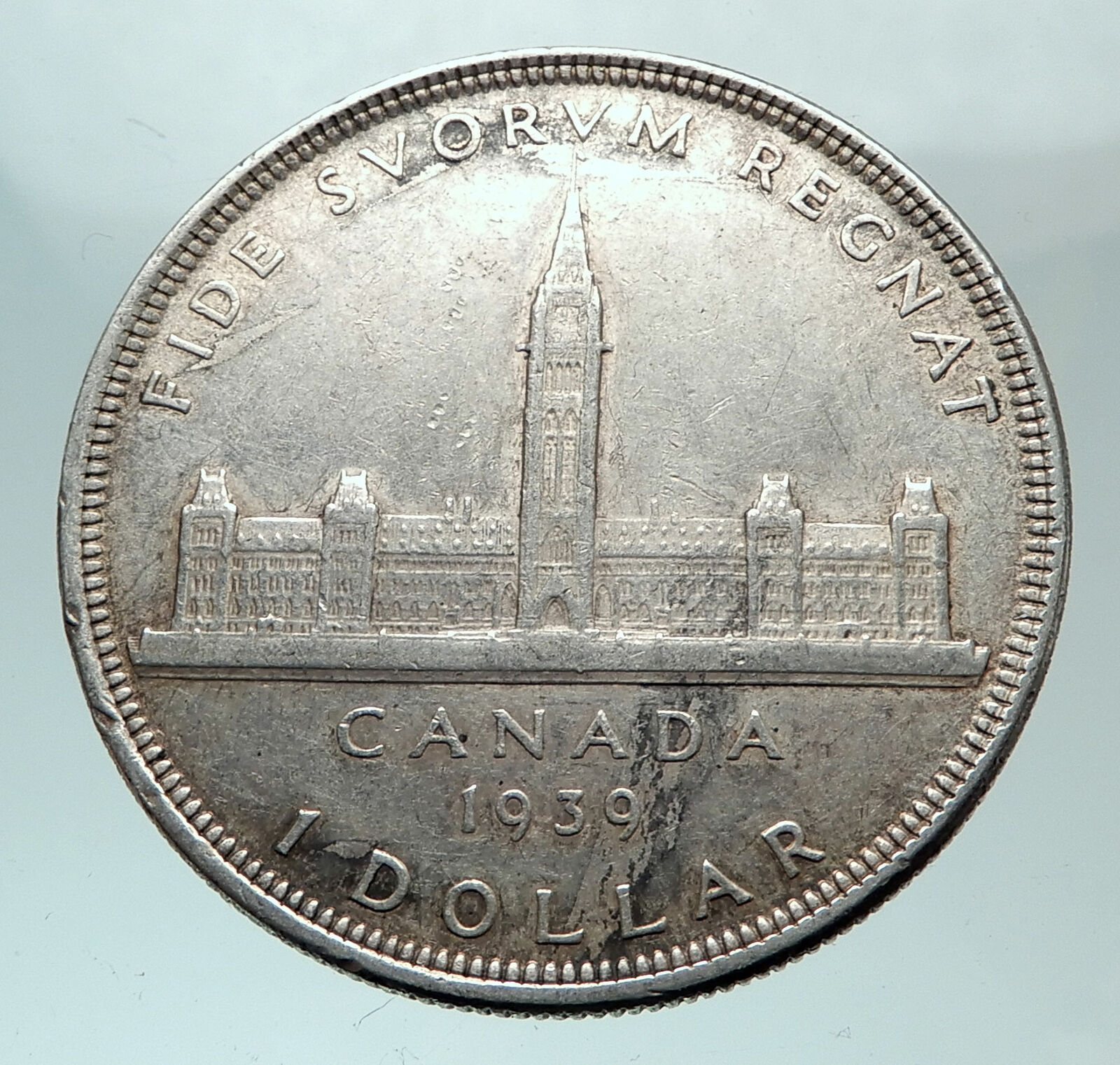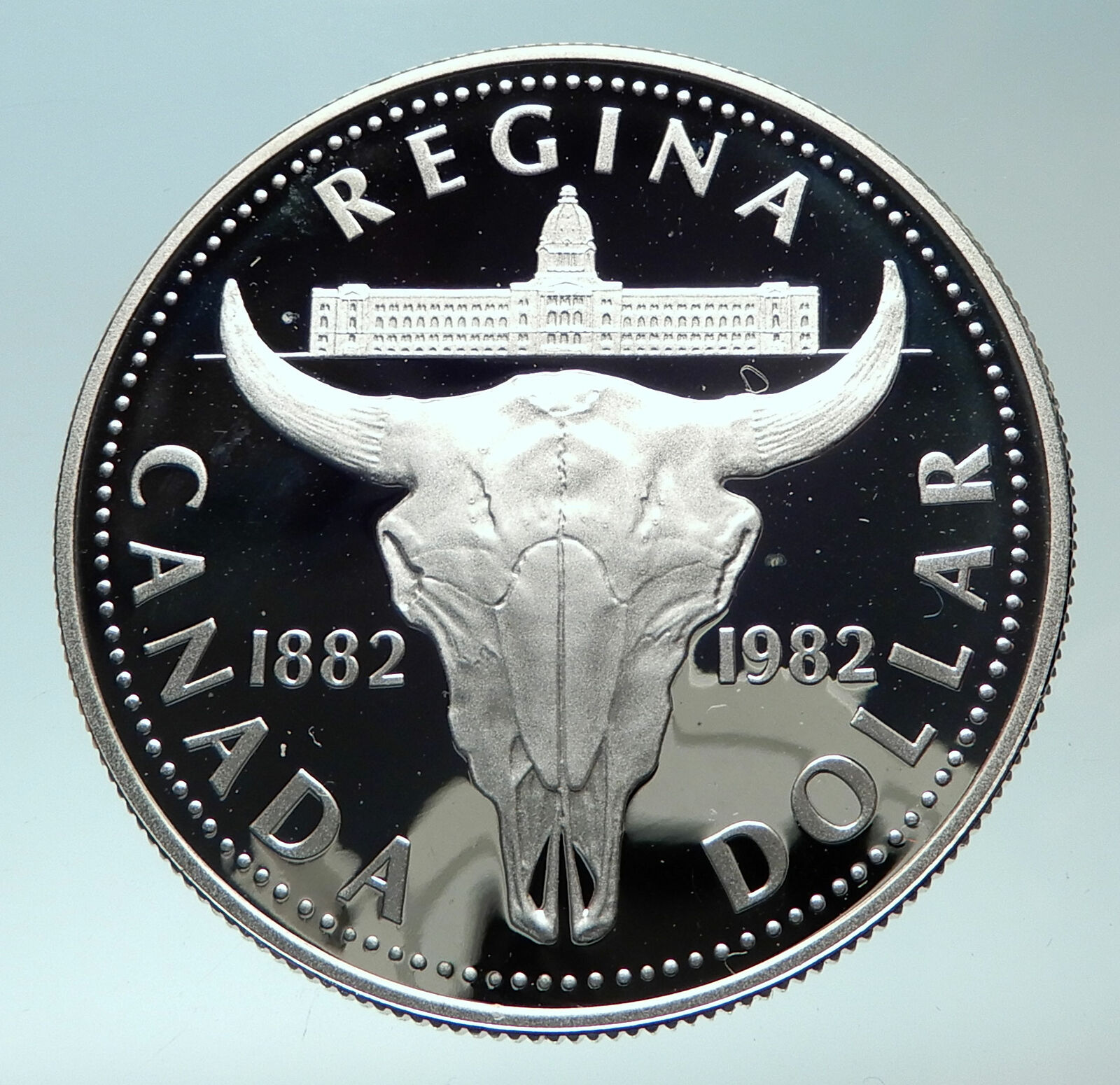|
Canada
British Columbia Commemorative
1958 Silver Dollar 36mm (23.27 grams) 0.800 Silver (0.5961 oz. ASW)
Reference: KM# 55
Obverse Designer: Mary Gillick
Reverse Designer: Stephan Trenka
ELIZABETH II DEI GRATIA REGINA, Laureate bust of Queen Elizabeth II right.
CANADA DOLLAR 1858 1958 BRITISH COLUMBIA, Totem pole.
You are bidding on the exact item pictured, provided with a Certificate of Authenticity and Lifetime Guarantee of Authenticity.
Totem poles are monumental sculptures carved on poles, posts, or pillars with symbols or figures made from large trees, mostly western red cedar , by indigenous peoples of the Pacific Northwest coast of North America (northwestern United States and Canada’s western province, British Columbia ). The word totem derives from the Algonquian (most likely Ojibwe ) word odoodem [oˈtuːtɛm], “his kinship group”. Totem poles are not religious objects, but they do communicate important aspects of native culture. Carvings of animals and other characters typically represent characters or events in a story. The carvings may symbolize or commemorate cultural beliefs that recount familiar legends, clan lineages, or notable events. The poles may also serve as functional architectural features, welcome signs for village visitors, mortuary vessels for the remains of deceased ancestors, or as a means to publicly ridicule someone. Given the complexity and symbolic meanings of totem pole carvings, their placement and importance lies in the observer’s knowledge and connection to the meanings of the figures.
Totem pole carvings were likely preceded by a long history of decorative carving, with stylistic features borrowed from smaller prototypes. Eighteenth-century explorers documented the existence of decorated interior and exterior house posts prior to 1800; however, due to the lack of efficient carving tools, sufficient wealth, and leisure time to devote to the craft, the monumental poles placed in front of native homes along the Pacific Northwest coast probably did not appear in large numbers until the late eighteenth or early nineteenth century. Trade and settlement initially led to the growth of totem pole carving, but governmental policies and practices of acculturation and assimilation sharply reduced totem pole production by the end of nineteenth century. Renewed interest from tourists, collectors, and scholars in the 1880s and 1890s helped document and collect the remaining totem poles, but nearly all totem pole making had ceased by 1901. Twentieth-century revivals of the craft, additional research, and continued support from the public have helped establish new interest in this regional artistic tradition.
 British Columbia, also commonly referred to by its initials BC, is a province located on the west coast of Canada . British Columbia is also a component of the Pacific Northwest and the Cascadia bioregion , along with the US states British Columbia, also commonly referred to by its initials BC, is a province located on the west coast of Canada . British Columbia is also a component of the Pacific Northwest and the Cascadia bioregion , along with the US states  of Idaho , Oregon and Washington . The province’s name was chosen in 1858 by members of the Hudson’s Bay Company . In 1871, it became the sixth province of Canada. Its Latin motto is Splendor sine occasu (“Splendour without Diminishment”). of Idaho , Oregon and Washington . The province’s name was chosen in 1858 by members of the Hudson’s Bay Company . In 1871, it became the sixth province of Canada. Its Latin motto is Splendor sine occasu (“Splendour without Diminishment”).
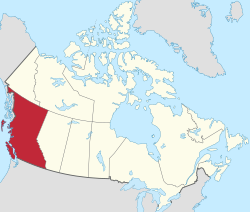 The capital of British Columbia is Victoria , the fifteenth-largest metropolitan region in Canada, named for the Queen who created the Colony of British Columbia. The largest city is Vancouver , the third-largest metropolitan area in Canada, the largest in Western Canada , and the second-largest in the Pacific Northwest . In October 2013, British Columbia had an estimated population of 4,606,371 (about 2.5 million of whom were in Greater Vancouver ). The province is currently governed by the BC Liberal Party , led by Premier Christy Clark , who became leader as a result of a leadership convention vote on February 26, 2011, and who led her party to an election victory on May 14, 2013. The capital of British Columbia is Victoria , the fifteenth-largest metropolitan region in Canada, named for the Queen who created the Colony of British Columbia. The largest city is Vancouver , the third-largest metropolitan area in Canada, the largest in Western Canada , and the second-largest in the Pacific Northwest . In October 2013, British Columbia had an estimated population of 4,606,371 (about 2.5 million of whom were in Greater Vancouver ). The province is currently governed by the BC Liberal Party , led by Premier Christy Clark , who became leader as a result of a leadership convention vote on February 26, 2011, and who led her party to an election victory on May 14, 2013.
British Columbia evolved from British possessions that were established in what is now British Columbia by 1871. First Nations , the original inhabitants of the land, have a history of at least 10,000 years in the area. Today there are few treaties and the question of Aboriginal Title, long ignored, has become a legal and political question of frequent debate as a result of recent court actions. Notably, the Tsilhqot’in Nation has established Aboriginal title to a portion of their territory, as a result of the recent Supreme Court of Canada decision (Tsilhqot’in Nation v. British Columbia).
British Columbia’s economy is largely resource-based. It is the endpoint of transcontinental railways, and the site of major Pacific ports that enable international trade. Though less than 5% of its vast 944,735 km2 (364,764 sq mi) land is arable, the province is agriculturally rich, (particularly in the Fraser and Okanagan valleys), because of milder weather near the coast and in certain sheltered southern valleys. Its climate encourages outdoor recreation and tourism , though its economic mainstay has long been resource extraction , principally logging, farming, and mining. Vancouver , the province’s largest city and metropolitan area, also serves as the headquarters of many western-based natural resource companies. It also benefits from a strong housing market and a per capita income well above the national average. While the coast of British Columbia and certain valleys in the south-central part of the province have mild weather, the majority of its land mass experiences a cold-winter-temperate climate similar to that of the rest of Canada. The Northern Interior region has a subarctic climate with very cold winters. The climate of Vancouver is by far the mildest winter climate of the major Canadian cities, with nighttime January temperatures averaging above the freezing point.
.svg/220px-Canada_(orthographic_projection).svg.png) Canada is a country, consisting of ten provinces and t hree territories, in the northern part of the continent of North America. It extends from the Atlantic to the Pacific and northward into the Canada is a country, consisting of ten provinces and t hree territories, in the northern part of the continent of North America. It extends from the Atlantic to the Pacific and northward into the  Arctic Ocean, covering 9.98 million square kilometres (3.85 million square miles) in total, making it the world’s second-largest country by total area and the fourth-largest country by land area . Canada’s common border with the United States forms the world’s longest land border. Canada is sparsely populated overall, the majority of its land territory being dominated by forest and tundra as well as the mountain range of the Rocky Mountains ; about four-fifths of the population live near to the southern border. The majority of Canada has a cold or severely cold winter climate, but southerly areas are warm in summer. Arctic Ocean, covering 9.98 million square kilometres (3.85 million square miles) in total, making it the world’s second-largest country by total area and the fourth-largest country by land area . Canada’s common border with the United States forms the world’s longest land border. Canada is sparsely populated overall, the majority of its land territory being dominated by forest and tundra as well as the mountain range of the Rocky Mountains ; about four-fifths of the population live near to the southern border. The majority of Canada has a cold or severely cold winter climate, but southerly areas are warm in summer.
The land now called Canada has been inhabited for millennia by various Aboriginal peoples . Beginning in the late 15th century, British and French colonies were established on the region’s Atlantic coast. As a consequence of various conflicts , the United Kingdom gained and lost North American territories until left, in the late 18th century, with what mostly comprises Canada today. Pursuant to the British North America Act , on July 1, 1867, three colonies joined to form the autonomous federal Dominion of Canada. This began an accretion of provinces and territories to the new self-governing Dominion . In 1931, Britain granted Canada near total independence with the Statute of Westminster 1931 and full sovereignty was attained when the Canada Act 1982 severed the vestiges of legal dependence on the British parliament .
Canada is a federal parliamentary democracy and a constitutional monarchy , Queen Elizabeth II being the current head of state. The country is officially bilingual at the federal level. It is one of the world’s most ethnically diverse and multicultural nations, the product of large-scale immigration from many countries, with a population of approximately 35 million as of 2015. Its advanced economy is the eleventh largest in the world , relying chiefly upon its abundant natural resources and well-developed international trade networks. Canada’s long and complex relationship with the United States has had a significant impact on its economy and culture.
Canada is a developed country and one of the wealthiest in the world, with the tenth highest nominal per capita income globally, and the eighth highest ranking in the Human Development Index . It ranks among the highest in international measurements of government transparency, civil liberties, quality of life, economic freedom, and education. Canada is a Commonwealth Realm member of the Commonwealth of Nations , a member of the Francophonie , and part of several major international and intergovernmental institutions or groupings including the North Atlantic Treaty Organization, the G8 , the Group of Ten , the G20 , the North American Free Trade Agreement and the Asia-Pacific Economic Cooperation forum.
|





 British Columbia, also commonly referred to by its initials BC, is a province located on the west coast of Canada . British Columbia is also a component of the Pacific Northwest and the Cascadia bioregion , along with the US states
British Columbia, also commonly referred to by its initials BC, is a province located on the west coast of Canada . British Columbia is also a component of the Pacific Northwest and the Cascadia bioregion , along with the US states  of Idaho , Oregon and Washington . The province’s name was chosen in 1858 by members of the Hudson’s Bay Company . In 1871, it became the sixth province of Canada. Its Latin motto is Splendor sine occasu (“Splendour without Diminishment”).
of Idaho , Oregon and Washington . The province’s name was chosen in 1858 by members of the Hudson’s Bay Company . In 1871, it became the sixth province of Canada. Its Latin motto is Splendor sine occasu (“Splendour without Diminishment”). The capital of British Columbia is Victoria , the fifteenth-largest metropolitan region in Canada, named for the Queen who created the Colony of British Columbia. The largest city is Vancouver , the third-largest metropolitan area in Canada, the largest in Western Canada , and the second-largest in the Pacific Northwest . In October 2013, British Columbia had an estimated population of 4,606,371 (about 2.5 million of whom were in Greater Vancouver ). The province is currently governed by the BC Liberal Party , led by Premier Christy Clark , who became leader as a result of a leadership convention vote on February 26, 2011, and who led her party to an election victory on May 14, 2013.
The capital of British Columbia is Victoria , the fifteenth-largest metropolitan region in Canada, named for the Queen who created the Colony of British Columbia. The largest city is Vancouver , the third-largest metropolitan area in Canada, the largest in Western Canada , and the second-largest in the Pacific Northwest . In October 2013, British Columbia had an estimated population of 4,606,371 (about 2.5 million of whom were in Greater Vancouver ). The province is currently governed by the BC Liberal Party , led by Premier Christy Clark , who became leader as a result of a leadership convention vote on February 26, 2011, and who led her party to an election victory on May 14, 2013..svg/220px-Canada_(orthographic_projection).svg.png) Canada is a country, consisting of ten provinces and t hree territories, in the northern part of the continent of North America. It extends from the Atlantic to the Pacific and northward into the
Canada is a country, consisting of ten provinces and t hree territories, in the northern part of the continent of North America. It extends from the Atlantic to the Pacific and northward into the  Arctic Ocean, covering 9.98 million square kilometres (3.85 million square miles) in total, making it the world’s second-largest country by total area and the fourth-largest country by land area . Canada’s common border with the United States forms the world’s longest land border. Canada is sparsely populated overall, the majority of its land territory being dominated by forest and tundra as well as the mountain range of the Rocky Mountains ; about four-fifths of the population live near to the southern border. The majority of Canada has a cold or severely cold winter climate, but southerly areas are warm in summer.
Arctic Ocean, covering 9.98 million square kilometres (3.85 million square miles) in total, making it the world’s second-largest country by total area and the fourth-largest country by land area . Canada’s common border with the United States forms the world’s longest land border. Canada is sparsely populated overall, the majority of its land territory being dominated by forest and tundra as well as the mountain range of the Rocky Mountains ; about four-fifths of the population live near to the southern border. The majority of Canada has a cold or severely cold winter climate, but southerly areas are warm in summer.

